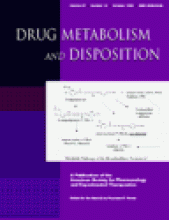Abstract
Although the liver has been considered the most important organ involved in glucuronidation, recent studies have focused on the role of the gastrointestinal tract in the glucuronidation of xenobiotics and endobiotics. Two UDP-glucuronosyltransferase (UGT) isoforms of human intestinal mucosa, which are absent in liver, have been identified by reverse transcriptase-polymerase chain reaction. mRNAs of UGT1A8 and UGT1A10 were detected in both the small intestine and the colon. The corresponding cDNAs for UGT1A8 and UGT1A10 were cloned from ileal RNA and inserted into the mammalian expression vector pcDNA3. Transfection of the cDNAs into human embryonic kidney 293 cells was carried out and stable expression was achieved. Membrane preparations from human embryonic kidney 293 cells expressing either UGT1A8 or UGT1A10 were isolated and the expression of each isoform was analyzed by Western blot. The catalytic activity of stably expressed UGT1A8 toward catechol estrogens, coumarins, flavonoids, anthraquinones, and phenolic compounds was much higher than that of UGT1A10. UGT1A8, but not UGT1A10, catalyzed the glucuronidation of opioids, bile acids, fatty acids, retinoids, and clinically useful drugs, such as ciprofibrate, furosemide, and diflunisal. These studies suggest that human intestinal UGTs may play an important role in the detoxification of xenobiotic compounds and, in some cases, limit the bioavailability of therapeutic agents.
Footnotes
-
Send reprint requests to: Dr. Thomas R. Tephly, 2–9452 Bowen Science Building, Department of Pharmacology, The University of Iowa, Iowa City, IA 52242. E-mail: Thomas-Tephly{at}uiowa.edu
-
This work was supported by National Institutes of Health Grants GM26221 (T.R.T.) and DK49715 and 51971 (A.R.-P.) and a grant from the Monsanto Company (T.R.T).
- Abbreviations used are::
- UGT
- UDP-glucuronosyltransferase
- HK293
- human embryonic kidney 293
- RT-PCR
- reverse transcriptase-polymerase chain reaction
- NSAIDs
- nonsteroidal anti-inflammatory drugs
- RA
- retinoic acid
- Received December 31, 1998.
- Accepted June 15, 1999.
- The American Society for Pharmacology and Experimental Therapeutics
DMD articles become freely available 12 months after publication, and remain freely available for 5 years.Non-open access articles that fall outside this five year window are available only to institutional subscribers and current ASPET members, or through the article purchase feature at the bottom of the page.
|






